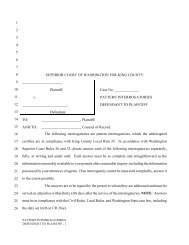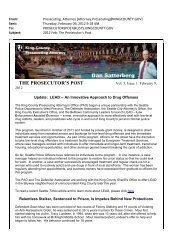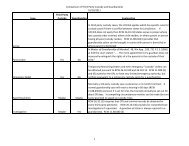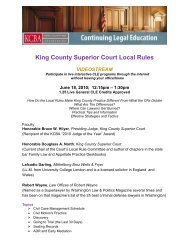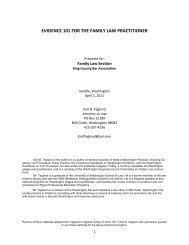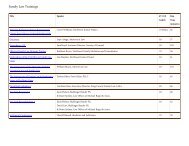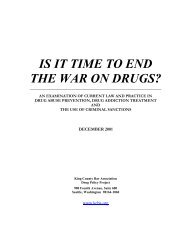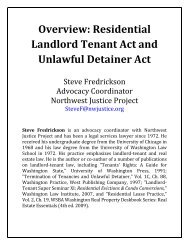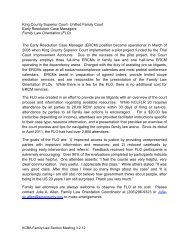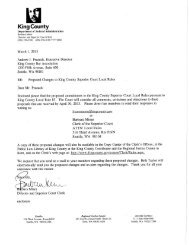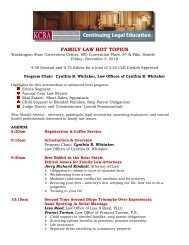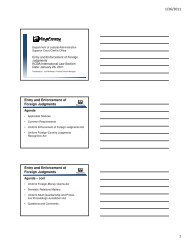Effective Drug Control: Toward A New Legal Framework
Effective Drug Control: Toward A New Legal Framework
Effective Drug Control: Toward A New Legal Framework
Create successful ePaper yourself
Turn your PDF publications into a flip-book with our unique Google optimized e-Paper software.
are used or stored by pharmacies, drug wholesalers, hospitals, outpatient surgery centers,<br />
doctors’ offices or clinics, nursing homes and adult family homes and boarding homes.<br />
The FDA regulates the initial approval of a drug and the manufacture and<br />
distribution. The decision whether or not to make a drug prescription or over the counter<br />
is not always based strictly on science. Advisory committees to the FDA recommend<br />
whether or not to allow a prescription drug to be sold over the counter before the FDA’s<br />
commissioner decides to accept or reject the finding, but such a decision involves more<br />
than science or patient safety, as influences like marketing and financial considerations,<br />
politics, doctors’ concerns and consumer psychology may also contribute. Doctors often<br />
prefer prescriptions for drugs that are generally safe enough to be over the counter<br />
because they would like the ability to monitor their patients’ use of the drugs and they are<br />
vocal about this concern whenever a drug comes up for consideration as an over-thecounter<br />
option. Although it is reasonable for doctors to be concerned for their patients’<br />
safety, some are concerned that it could prevent people from having easier access to<br />
medicines they need. 457<br />
The “gray market” is the term used to describe the market in diverted legal<br />
prescription drugs. These drugs are diverted not only by drug abusers but by licensed<br />
health care professionals and others at any site where the drugs are stored, administered,<br />
prescribed or dispensed. The manners in which drugs are diverted include theft, armed<br />
robbery, burglary, record alteration, prescription forgery, “wastage” and substitution. For<br />
example, from January through February of 2003, drug thefts from pharmacies in the<br />
state of Washington included four armed robberies, four burglaries, eight employee thefts<br />
and four lost-in-transits, totaling 28,925 dosage units at a cost of $20,893. The main drug<br />
implicated was Oxycontin. In 2002, the Washington State Pharmacy Board investigated<br />
130 nurses, 6 pharmacists, 13 pharmacy techs and one pharmacy intern for diversion.<br />
These investigations may lead to criminal charges or, at the very least, administrative<br />
proceedings by their respective professional boards, but the Pharmacy Board prefers to<br />
employ the “medical model” rather than the “criminal model.” The boards send violators<br />
to treatment, withhold their licenses until required follow-ups with aftercare and<br />
meetings, and monitor them for up to five years with urinalysis. 458<br />
Existing <strong>Legal</strong> Remedies – Civil and Other Non-Criminal Sanctions<br />
Civil Proceedings: The Other “<strong>Drug</strong> Courts”<br />
Courts hearing certain types of civil cases already operate as a parallel system of<br />
“drug courts.” The civil courts are concerned with assessing and addressing conduct that<br />
adversely affects others – particularly children – and such conduct is often associated<br />
with substance abuse. Compared with the criminal courts, the civil courts are charged<br />
with evaluating harm and finding remedies, rather than determining guilt and meting out<br />
punishment, and are therefore more remedial and therapeutic in nature. 459<br />
Civil courts are regularly called upon to evaluate and remedy the impacts of drug<br />
use in family law cases involving divorce, child custody, child support, and child welfare.<br />
<strong>Drug</strong> use might be addressed in the course of a tort claim, employment law case or civil<br />
commitment proceeding. The following is a partial list of civil proceedings in which



